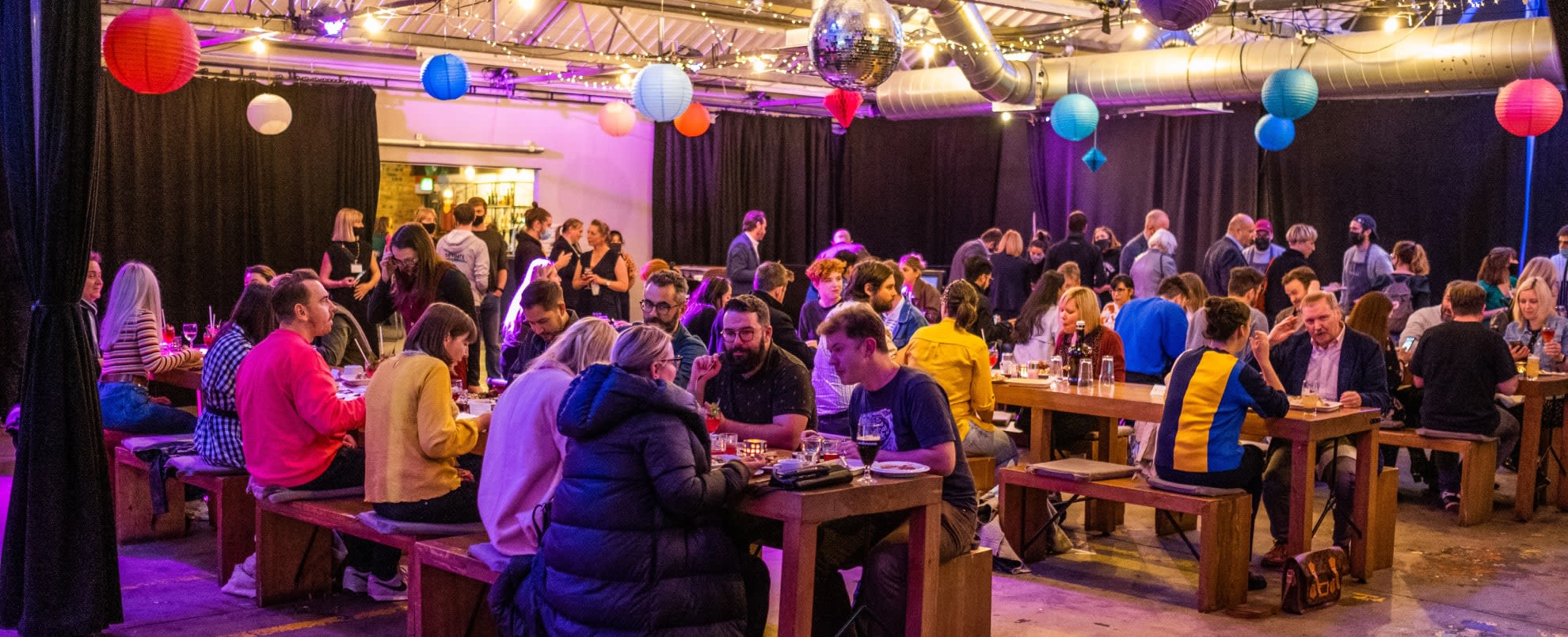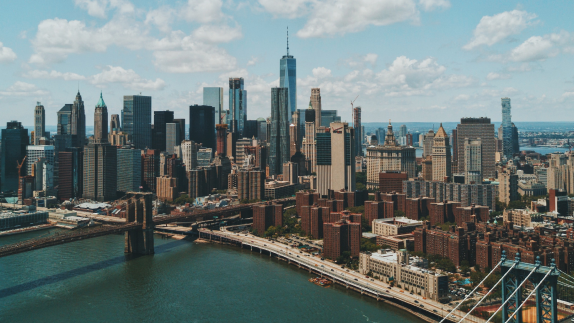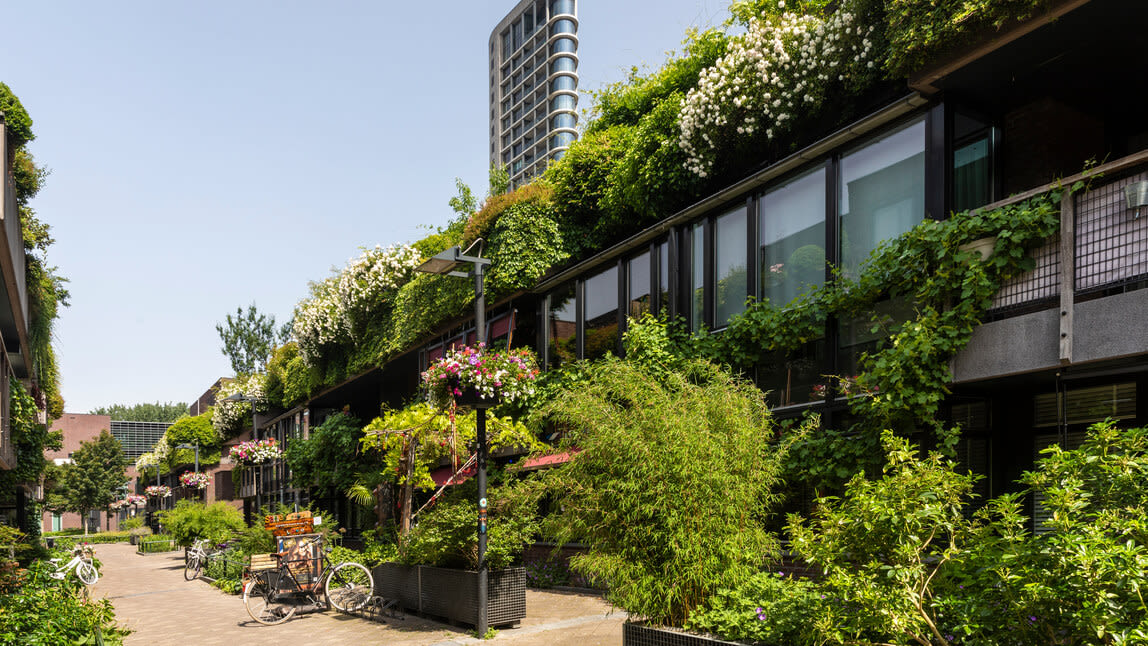After building a network of circular economy businesses, Circular Glasgow, part of Glasgow’s Chamber of Commerce, worked with the hospitality industry to design low-waste meals during COP26
Circular Glasgow
Glasgow has set a goal to become a fully circular city by 2045 and net-zero carbon city by 2030. One of its most successful programmes to help achieve these goals is Circular Glasgow, which was set up in 2017 by Glasgow Chamber of Commerce to galvanise local businesses to take advantage of the circular economycircular economyA systems solution framework that tackles global challenges like climate change, biodiversity loss, waste, and pollution. It is based on three principles, driven by design: eliminate waste and pollution, circulate products and materials (at their highest value), and regenerate nature. opportunity.
Circular Glasgow aims to encourage businesses to adopt circular strategies and in so doing, unlock new revenue streams, boost innovation, and increase competitiveness. It is supported by Zero Waste Scotland and Glasgow City Council, and funded with support from the European Regional Development Fund.
Business activation
With its diverse network of businesses, Glasgow Chamber of Commerce - a voluntary, not-for-profit membership organisation - is an ideal platform to reach and engage with businesses of all sizes and sectors throughout the city. Since 2017, Circular Glasgow has built a 300-strong circular economy stakeholder network, made up of businesses, innovators, public sector organisations and people with an interest in the circular economy. Through regular networking events and an online platform, businesses can share experiences and best practices for implementing circular economy approaches. To date, the initiative has engaged with over 650 business representatives, and convened business ambassadors from multiple industries to advocate for the circular economy within the business community.
Building on the strength of this network, Circular Glasgow has delivered a number of business activation campaigns. The most notable of these was 2021’s Plate up for Glasgow.
Plate up for Glasgow
Plate up for Glasgow was a food waste reduction campaign focused on the hospitality industry that took place during COP26. 41 local hospitality businesses developed innovative, low-waste menu items, to help tackle emissions associated with food waste.
The current linear food system is responsible for approximately a third of all global emissions, and over half of human-led pressures on biodiversity. In Scotland, 1.35 million tonnes of food waste are generated per year – one in every six meals that are served are being wasted. Disposing of the waste also comes at huge costs to both businesses (average £10,000 per hospitality business per year) and Scottish councils (£85 million every year).
Plate up for Glasgow was a five-week campaign aiming to raise awareness and change practices among restaurants, hotels, cafés, bars and pubs in Glasgow. By design, it spanned the COP26 climate conference taking place in the city, capitalising on heightened awareness of climate change and global efforts to curb it.
41 participating hospitality businesses came up with and served ‘Food Hero’ dishes and drinks specially designed to use food parts that would otherwise be discarded and incorporate food preservation techniques. Over the course of the campaign, Glaswegians and COP26 attendees consumed more than 4,000 low-waste dishes and drinks from venues around the city.
At the same time, an online awareness campaign provided food waste prevention tips and resources to consumers, and expanded the reach of the campaign to over 55 million people.
Funded by Zero Waste Scotland and the hospitality industry network Experience Glasgow Food and Drink, Plate up for Glasgow also contributed to multiple policy aims, among them the Scottish Government’s target of cutting the country’s food waste output by 33% by 2025, and the Courtauld Agreement, signed by the Scottish Government, which requires the UK’s hospitality and food service sector to save 115,000 tonnes of food from being wasted.
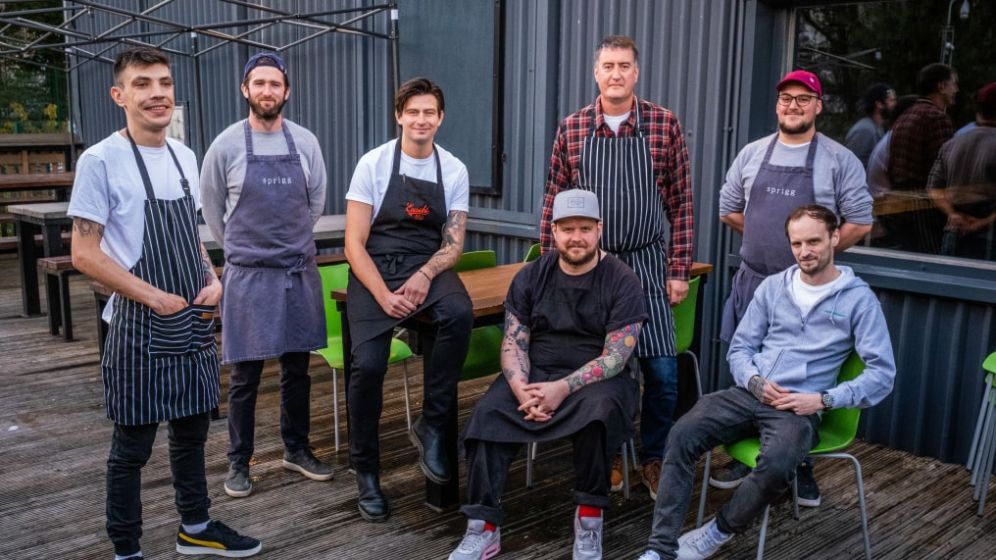
Image credit: Chris Watt Photography

Image credit: Chris Watt Photography
Designing meals to reduce food waste
Circular food design means using diverse, lower-impact, upcycled and regenerative ingredients to create food products that are not only nutritious and tasty, but also create positive outcomes for nature, farmers, and business. Using upcycled ingredients could help to meet the global population’s growing nutritional needs without increasing pressure to convert ecosystems to agricultural land, which is one of the primary drivers of biodiversity loss.
The Plate up for Glasgow campaign invited businesses to upcycle food parts normally considered ‘waste’ into nutritious ingredients for new dishes and drinks – not only edible parts of produce that might otherwise get thrown away, but also inedible by-products such as animal bones, used coffee grounds and fruit peels. The ask was to come up with a dish or drink based on one or more parameters:
Rethinking existing menu items – for example, using parts of ingredients that would normally be discarded, like vegetable stalks leaves and meat offcuts.
Showcasing food preservation techniques – such as drying, pickling, smoking, and fermenting, to save produce from being prematurely thrown away.
Using unfashionable cuts of meat, similar to butchery’s nose-to-tail approach.
Creating a dish from surplus or donated food – for example, food suppliers sometimes give venues ‘surprise’ ingredients when they have too much of them.
A sample of low-waste ‘Food Hero’ menu items created for the campaign

The chocolate in this dessert was produced locally, while the icecream used cocoa bean husk, a by-product of the chocolate production process. Image credit: Glasgow Restaurant Association via Twitter

This drink from The Gate contains bruised strawberry cordial and vodka made from the grape skins, stems and seeds that are a byproduct of winemaking. Image credit: Chris Watt Photography

This dish from Eusebi Deli uses every part of the cauliflower, from the leaves to the core. Image credit: Eusebi Deli via Twitter
Impact
The campaign had lasting impacts on the participating venues. The majority (88%) committed to keeping their campaign dish or drink on the menu in future and more still (92%) were keen to participate in similar collaborations in the future. Most (60%) also perceived food waste as more important after having taken part in the campaign.
“The campaign has created even more of a focus on addressing food waste. Thanks to Plate up for Glasgow, we no longer feel like a lone soldier. We now have a community of like-minded businesses all looking to share ideas and solutions.”
- Giovanna Eusebi, Owner and Founder, Eusebi's Deli & Restaurant
The campaign was a finalist in Scotland’s Environmental Awards, the VIBES. Learnings were shared with several other Scottish regions which aim to replicate the campaign. Plate up for Glasgow laid the foundations for a second food waste campaign, Grounds for Recycling, which collected used coffee grounds from 60 businesses and transported them by cargo bike to Glasgow’s Botanic Gardens for compostingcompostingMicrobial breakdown of organic matter in the presence of oxygen..
Planning and process
The Circular Glasgow team of two comprised a Partnership Manager and Campaign Lead. Additional support for staff time, marketing and PR came in the form of funding from Experience Glasgow Food and Drink (£10,000) and Zero Waste Scotland (£38,500).
Preparing, running and assessing the campaign involved:
Reviewing low waste dish proposals from participating venues to ensure entry criteria were met and to identify innovative techniques
Creating a Hospitality Toolkit including campaign aims and parameters, benefits of reducing food waste, tips, example recipes, and practical resources
Creating a guide for consumers to reduce food waste at home
Showcasing participating businesses on the website and sharingsharingThe use of a product by multiple users. It is a practice that retains the highest value of a product by extending its use period. campaign messages on social media
Visiting participating venues regularly to ensure high standards and consistent messaging, and to strengthen relationships with industry stakeholders
Meeting with industry leaders to gather insights and develop a strategy for reducing food waste
Providing a platform for wider industry discussions on sustainability in hospitality
Collecting data from businesses and assembling an evaluation report.
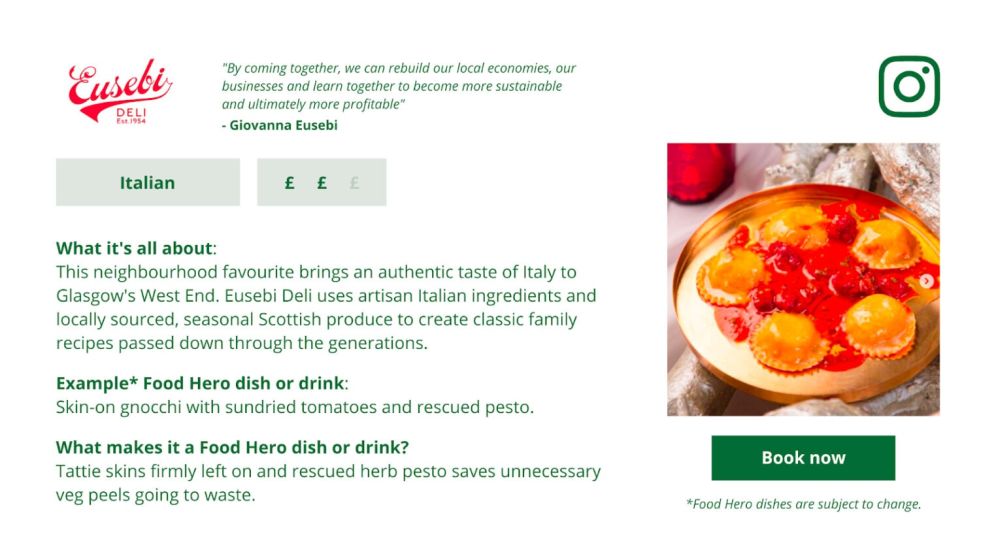
Business showcases on campaign website
Benefits for businesses
Participating businesses say they saw cost savings, reductions in waste volumes, behavioural change among staff, and improved engagement with customers.
Over half of businesses (56%) found that Plate up for Glasgow gave them the opportunity for better engagement with their customers. Taking part in the campaign also improved knowledge levels and communication among staff – 40% of venues reported that it created opportunities to introduce sustainability and food waste training.
Some businesses reduced the volume of ingredients they had to purchase, because they instead found new uses for existing products whose sales had previously underperformed. Others reported the benefits of sharing ideas with other businesses on how to address problems.
“On reflection, Plate up for Glasgow has me realising that it’s pretty incredible how much produce and valuable stock could be created from so little. If this approach was the basis of an entire menu, someone could be making some outstanding profits, not to mention salvage of waste!”
- Chris Dougan, General Manager, Bar Vini
Challenges and lessons learned
The campaign team faced significant challenges gathering data from hospitality businesses, particularly around food waste volumes. This was often due to lack of time and resources among businesses, but was also affected by external variables such as disruptions due to COP26. In the end, just under half of all participating venues returned their results, while post-campaign interviews could only be carried out with 25 participating businesses. Making return-of-data a mandatory requirement of participation could help ensure better data in future campaigns. Better resourcing in the campaign team could also support businesses with their own communications around the campaign.
The post-campaign participant survey revealed that businesses face key barriers when implementing measures around food waste: they lack information, financing, time, and team expertise to effectively create and promote food waste reduction solutions. Cities can support businesses in the hospitality sector to overcome these challenges by:
Creating an information and resource hub to find circular economy solutions – helping hospitality businesses find funding and subsidies, suitable products, suppliers and technology, and allowing them to exchange experiences and best practice.
Providing expertise and networks to other industry stakeholders – businesses taking part in Plate up for Glasgow highly valued the knowledge and access to stakeholders that the campaign team provided.
Promoting the hospitality industry as a rewarding career path to attract new workers.
Offering financial incentives for businesses implementing food waste reductions.
A number of these learnings were applied in the city’s follow-up campaign, Grounds for Recycling. The campaign centred around a major global event, the 2023 UCI Cycling World Championships, and involved world-renowned cyclist Jenny Graham. Through early and continued engagement with businesses, the Circular Glasgow team set clear expectations around data return, and took into consideration feedback around campaign timeline. To help with staff training and communications, they also provided businesses with recyclable bags for waste coffee and fact sheets for staff. These measures resulted in better data collection and reporting from participating businesses, which in turn helped communicate the campaign’s impact: over the 20-day campaign, 4.7 tonnes of used coffee grounds were collected and transported by cargo bike for composting, covering a total distance of 597 miles and avoiding 184 hours of van use on roads.

These on-the-ground activation campaigns demonstrate the challenges around disrupting linear material flows and systems. Crucially, they also show how nurturing collaboration among businesses can start to shift mindsets as all stakeholders work together towards a common goal.
Where next for Glasgow?
Circular Glasgow’s work to convene a network of organisations with an active interest in the circular economy, coupled with its material flow analysis that set out the key opportunities and strategies, laid the foundations for wider efforts towards circularity in the city. In 2020, the city published its first circular economy roadmap, which set a common direction of travel for the whole city. This is currently being reviewed to better connect the city’s circular economy work to climate action and address consumption-based emissions, an increasingly important part of cities’ climate policies.
Glasgow’s circular economy activities also span the textiles and built environment sectors. For example, the City is exploring how to develop a system for the recovery and reusereuseThe repeated use of a product or component for its intended purpose without significant modification. of construction materials and how to establish a circular construction forum.
Glasgow’s work is further supported by the Scottish Government’s circular economy agenda. The national circular economy strategy Make Things Last was published in 2016, and more recently, its Circular Economy Bill gives necessary powers to Ministers and local councils. These powers include the ability to set circular economy targets, ban the disposal of unsold consumer goods, and place charges on single-use items.
